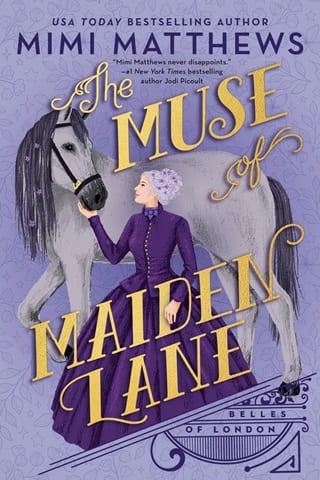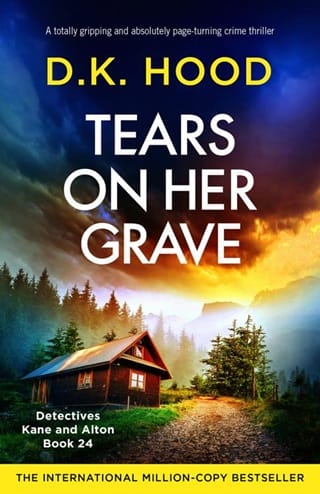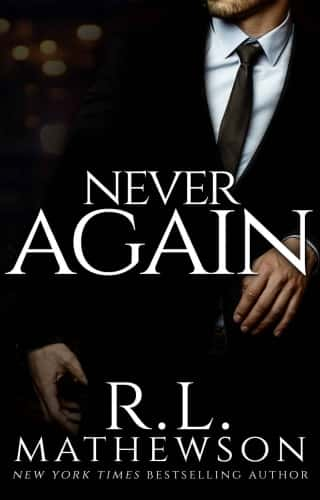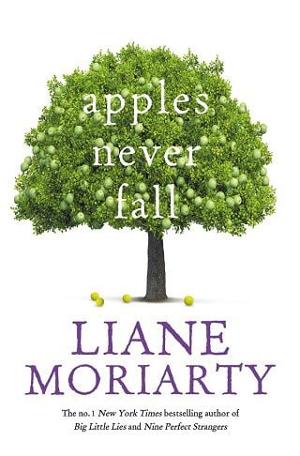Chapter Six
Six
“Circassian gold, my old aunt Sally,” Anne said hotly. Wearing a hastily donned embroidered silk robe over her corset and petticoats, she stood behind Stella at the dressing table, staring at Stella’s damp hair in pale-faced fury. “Any dye worth its salt must surely last more than three days.”
“It was supposed to last a week.” Stella’s teeth chattered in response to the incipient cold. She’d been sitting in front of the mirror for nearly ten minutes, too much in shock to move in front of the fire.
“After which?” Anne prompted.
“The pamphlet said it would gradually fade to a strawberry sheen,” Stella replied.
Anne scoffed at the pronouncement. “And you believed it?”
“Of course I did!” A hysterical note crept into Stella’s voice. “How could they print it if it wasn’t true?”
“There’s no point in us arguing about what’s already done,” Anne said hastily. “Though I must say, these women promising Circassian beauty have a lot to answer for. They’re no better than poison peddlers and quacksalvers, to my mind. Still”—she lifted a damp strand of Stella’s hair to examine the unfortunate hue in the lamplight—“I suppose things could be worse.”
“How could it be worse?” Stella’s tone became shrill. “My hair is green , Anne!”
“It’s not green. It’s…Very well. It’s green. But it shan’t be for long. We’ll simply wash it again.” Anne briskly summoned her maid. “Jeanette? Go to the kitchens and have Cook make up a solution of borax, olive oil, and boiling water.” She turned back to Stella, explaining, “Mrs. Beeton swears by the mixture in her Book of Household Management .”
“Yes, my lady.” Jeanette curtsied before scurrying from the room.
“She fears she’ll be blamed,” Anne said. “Silly creature. I don’t suppose she’s had much experience with hair dye.”
Anguish welled in Stella’s throat. She wouldn’t have thought it possible to feel both shock and hysteria at the same time. The inevitable consequences of what she beheld in the mirror reverberated through her. Her hair was no longer auburn. It was no longer gray. It was the color of congealed pea soup.
“I shouldn’t have done it,” she said.
“It’s rather too late for that now,” Anne replied. “The best we can do is see this through to the other side.”
Stella scarcely registered her words. She was too caught up in her own misery. “Daniel would say this is God’s doing. He’d tell me I was being punished for the sin of vanity.”
Anne gave an eloquent snort. “Rubbish. God has better things to do than hang about Hampshire turning ladies’ hair green. This is deceptive beauty advertising, plain and simple. You’re not the first female to fall victim to it. But you mustn’t despair. We shall soon set it right.”
“What if the borax doesn’t work?”
“We’ll try another hair wash recipe, and then another. We’ll go through the whole store cupboard if we have to.”
Stella met Anne’s gaze in the mirror. Her eyes pooled with tears. “Someone will find out. They’ll discover what a fool I’ve made of myself and carry the dreadful news straight back to London. Society will never forget it. And when Daniel learns—”
“No one will find out.”
“How not? The house party has four days remaining. Even if we do manage to wash the green away, it will only be gray. That alone will cause remark. I’ve had auburn hair since I arrived in Hampshire. No one here knows my real color except for you, your mother, and Mr. Hartford.”
And Mr. Hayes.
But Stella couldn’t afford to think of Mr. Hayes in this moment. One gentleman’s opinion meant nothing in comparison to the condemnation of the whole of society.
Anne chewed her lip. “I suppose we could dye it back. Do you have any of the Circassian gold left?”
Stella shook her head. “I used the entire bottle. I’d no notion I’d require another application.”
“I wouldn’t advise one anyway,” Anne said. “Not after this debacle. Who knows but that it might not make your hair fall out entirely.”
Stella emitted a strangled moan.
Anne grimaced. “Sorry. I’m not helping, am I?”
Stella dropped her face into her hands. “I shall have to hide for the rest of the house party. You shall have to tell everyone I died.”
“We needn’t go that far. There are caps and bonnets, after all. We’ll simply disguise your hair, just as you do when you’re riding in Rotten Row.”
“I can’t wear a cap at dinner. I can’t wear a bonnet in the ballroom.”
“Regrettably, no. You’ll have to forgo those events.” Anne set a consoling hand on Stella’s shoulder. “I’m sorry, dearest. I know you’d hoped to meet someone during your stay.”
Stella bleakly lifted her head. She was suddenly very tired. “It was a stupid plan, anyway, coming here in disguise. There’s no way to hide who I really am. Not for long. Any gentlemen who thought me worth courting would find out the truth eventually.”
“There’s nothing wrong with who you are.”
“What I am,” Stella said, “is unmarriageable.”
Anne pressed Stella’s shoulder in a reassuring squeeze. “These are not subjects to contemplate when one’s hair is green,” she said wisely. “Let me first restore your beautiful gray, and then we shall discuss them.”
“What if you can’t?”
“Oh, ye of little faith.” Anne gave her a bracing look in the mirror. “Don’t you know by now? There’s nothing I can’t do.”
?On Christmas morning, Teddy awakened to find the windows of his room frozen over with a thick sheet of ice. The temperature had dropped dramatically during the night, and outside the grounds were blanketed in a pristine layer of snow. It covered the hills and pastures and clung to the branches of the majestic wych elm trees that flanked the house, sparkling like fine crystal in the cold winter sun.
It was too great an artistic opportunity to miss.
After spending a few brief moments with Alex and Laura, exchanging gifts and sharing a pot of chocolate in the privacy of their bedchamber, Teddy dressed, gathered his art supplies, and—with the aid of his manservant—took himself off to the secluded upstairs parlor the earl had given leave for him to use as a temporary studio.
There, Teddy set up his easel in front of a tall sash window. It gave him an unimpeded view of an aged oak sitting atop a snow-covered hill some distance away. A stark subject, with a hint of melancholy about it. The snow below the tree was bathed in a dazzling array of changing light.
Within two hours, Teddy’s oil-painted depiction was well under way.
He’d cut his teeth on landscapes as a boy, forever painting some tree or bush or wildflower-blanketed meadow. After that, he’d graduated to birds. And then, eventually, to the sea. It was more satisfying to commit life to canvas, whether it was the raging waves or a song thrush in flight. A swirling snowscape was but a distant alternative, but it still had its lure.
Of course, it was nothing compared to a beautiful woman. To the elegant curve of a feminine cheek, the swell of a voluptuous hip, or the shimmer of sensual mystery in an otherwise ladylike gaze. It was that which most captivated Teddy’s artistic attention now.
Regrettably, Miss Hobhouse had so far eluded him.
She hadn’t been at dinner last night. And she hadn’t attended the Christmas Eve dance, much to his irritation. He’d watched for her for nearly two hours before Laura had reported that she’d heard—via Lady Anne—that Miss Hobhouse had retired to bed with a nameless indisposition.
“ Don’t be cast down ,” Laura had said to him. “ You’re bound to see her tomorrow. Lord March will be hosting a grand Christmas tea in the drawing room. Miss Hobhouse is sure to attend .”
Teddy doubted whether she would. His elusive silver star appeared a resourceful sort of girl. If she was set on avoiding him for the remainder of the house party, she’d likely succeed in her goal.
Drat it altogether.
He laid on a brushstroke with unneeded force. The thick layer of flake white paint globbed on the canvas, marring the careful shadowing he’d created on the snowbank. It was an amateurish mistake, completely unworthy of an artist of Teddy’s skill. He uttered an eloquent French curse as he corrected his error.
“You’ll be needing your tea, sir,” Jennings said from his place near the fire.
Teddy continued painting, ignoring him.
But Jennings could never be ignored for long. He rose from his chair and crossed the length of the small parlor.
The earl had offered the room to Teddy at the dance last night. It had better light than the morning room where Teddy had sketched yesterday. It was also far more secluded. Located down an isolated corridor in the east wing of the house, the private parlor was set away from the guest rooms and the traffic of the common areas. Here, there would be no chance of Teddy’s work being interrupted.
Unless that interruption was caused by his own bloody servant.
Jennings stopped in front of the window, blocking Teddy’s light. “Did you hear me, sir?”
Teddy glanced up from his canvas with no little irritation. “What have I told you about disrupting my concentration?”
“Beg pardon.” Jennings took hold of the back of Teddy’s chair. “Mrs. Archer said as how I wasn’t to let you forget to eat.”
“Mrs. Archer doesn’t employ you. I do.” Teddy picked up another dab of paint from his light wood palette. “My brother-in-law may have hired you to begin with, but I pay your wages now. I won’t be disturbed when I’m working.” He shot a severe look at the man. “I’ll thank you to let go of my chair.”
“But Mr. Hayes—”
“I’ll be joining the others for tea in the drawing room later.”
“That’s not for hours yet, sir.”
“Then I shall wait,” Teddy said. “If you’re wanting your own tea in the interim, have it, by all means. I’ll do very well on my own for the next hour.”
Jennings reluctantly released his grip. “I shan’t need more than ten minutes.”
“ An hour ,” Teddy repeated. “Two if you like. I’ll not have you spending the whole of your Christmas waiting on me. I’m not Mr. Scrooge, for God’s sake.”
Jennings didn’t appear to understand the reference. He wasn’t much of a reader. “What if you need help while I’m gone?”
“I have access to the bell pull, don’t I?”
“Yes, but—”
“Then we’re agreed,” Teddy said. “Now take yourself off before you cause me to make another mistake.”
With a grudging grunt of compliance, Jennings retreated from the room. He would undoubtedly be back before the clock struck two. There was no persuading him to forget his duty to Alex and Laura.
As Teddy resumed painting, it occurred to him that he would do well to find himself another manservant when he settled in London. A man of absolute loyalty. One he could choose all on his own. Unfortunately, there was more skill required for assisting him than the average manservant possessed. Any mistakes in selecting the fellow would come to weigh on Teddy and Teddy alone. Who knows but that he might not find himself abandoned in his chair in an upstairs room or left to languish somewhere with no hope of summoning aid?
Teddy’s jaw tightened to think of it. His wheeled chair gave him much-needed mobility, but he still required human assistance. And, in his experience, hired humans came in only two varieties: either painfully intrusive or intrinsically unreliable. Teddy couldn’t risk landing with one of the latter, so—despite the man’s shortcomings—Jennings it was and Jennings it would have to remain.
Returning his attention to his canvas, Teddy spent the next quarter of an hour adding a branch on his tree. He was just beginning the outline of another branch when his stomach uttered a distinct growl of complaint. Perhaps Jennings had been right. Teddy should stop to eat. He often forgot to when working. In the past, he had, at times, been too thin. It wasn’t conducive to the active life he now envisioned for himself. For that, he must keep up his strength.
Setting aside his paintbrush and palette, he reversed his chair from in front of the easel and turned it in the direction of the bellpull across the room. In most circumstances, he could maneuver the wheels himself indoors. Especially now that he’d put on weight and muscle enough for the task. His only limitation lay in the terrain. Stairs were impossible, slick marble was a challenge, and thick carpeting was a bloody nuisance.
He muttered another curse as he laboriously rolled over the lush Aubusson that covered the parlor floor. His frustrated expletive was answered by a feminine gasp.
“Oh!” a soft voice exclaimed. “I thought this room was supposed to be empty.”
Teddy’s head jerked to the doorway. Every molecule in his body leapt to attention. He felt, all at once, as elementally alert as a vibrating tuning fork. He suppressed a smile. Suppressed hope. By God but there would be no eagerness this time. He’d be stoic and disinterested if it killed him.
“Miss Hobhouse,” he said with a creditable degree of calm. “Happy Christmas morning.”
 Fullepub
Fullepub 



